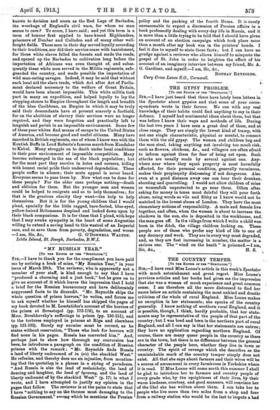THE GYPSY PROBLEM.
[TO THE EDITOR or THE "SPECTATOR...] SIR,—I have just heard that there have lately been letters in the Spectator about gypsies and that some of your corre- spondents wrote in their favour. No one with any real knowledge of their habits could find anything to say in their defence. I myself had sentimental ideas about them, but that was before I knew their ways and methods of life. During the last two years I have seen a great deal of them, and at close range. They are simply the lowest kind of tramp, with not one single characteristic, physical or mental, to connect them with the old gypsy. The women and children beg and the men steal, taking anything not involving too much risk, such as flowers, chickens, &c., and villagers are often afraid to inform against them for fear of being set upon. Such attacks are usually made by several against one. Any- where near where they squat property is most harmfully affected, for their personal condition, generally verminous, makes their propinquity distressing if not dangerous. Alen even at a good distance away one can hear their drunken. shouting and quarrelling. I would not allow children of mine or womenfolk unprotected to go near them. Often after asking for money in tones most doleful they will pour forth abuse, using words so vile and filthy as I know would not be matched in the lowest slums of London. They have the most elementary notions of responsibility. A male and female live together, and often, when the woman is about to increase the shadows in the sun, she is deposited in the workhouse, and. the man goes off. In the village from which I write a child was born in the ditch, the village children looking on. These people are of those who prefer any kind of life to one of any decency and work. They are in every way most degraded, and, as they are fast increasing in number, the matter is a serious one. The "wind on the heath" is poisoned.—I am,














































 Previous page
Previous page